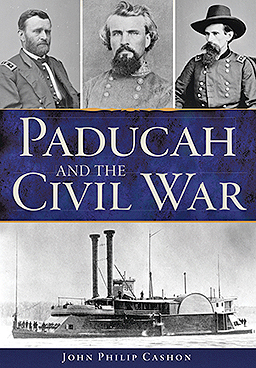|
Bugle book review…
If Grant had not taken Paducah, could
outcome of Civil War been different?
(PADUCAH AND THE CIVIL WAR, by John Philip Cashon, 118 pages with notes, bibliography and index, The History Press 2016, paperback $21.99)
By ED FORD
Bugle Editor
Author John Philip Cashon offers an interesting and, possibly, a very valid point about Paducah in the Civil War.
He contends U.S. Grant’s successful takeover of Paducah in September 1861 was, perhaps, the single most important move the Union general made during the war.
 Grant took Paducah without a single shot being fired. With the McCracken County seat in his grasp, he maintained control of the Tennessee and Cumberland Rivers, which enabled the Union to run supply lines deep into Southern states. Grant took Paducah without a single shot being fired. With the McCracken County seat in his grasp, he maintained control of the Tennessee and Cumberland Rivers, which enabled the Union to run supply lines deep into Southern states.
“Without Grant taking Paducah, the war in the west may have been very different and victory for the Union cause may not have occurred,” Cashon suggests.
Paducah was somewhat divided about opposing Union troops when the Federals took control of Columbus, then moved into Cairo, Ill., at the confluence of the Ohio and Mississippi Rivers, Cashon points out. Even Paducah’s Lloyd Tilghman, commander of the western division of the Kentucky Militia, said, “We do not wish war.” And, the state of Kentucky agreed, voting in May to remain neutral.
However, the Jackson Purchase, of which Paducah was a part, was ready to secede. Torn between opposing points of view, Paducah was between the virtual rock and a hard place.
The author notes that on May 19 a convention met in Mayfield to discuss the possibility of the Jackson Purchase separating from Kentucky and uniting with Tennessee. But, there was not enough support for leaving the Commonwealth.
Paducah, however, had a very Southern culture. Being west of the Tennessee River, the Purchase was geographically isolated from the rest of the state. As a result, the reader gets the feeling Paducah was treated much like a Kentucky stepchild.
Confederate Gen. Nathan Bedford Forrest finally brought the fight to Paducah in 1864, but was repulsed by the Union’s heavily fortified Fort Anderson. Cashon covers that raid and develops an in-depth look at the terrorizing reign of Union Gen. Eleazer Paine who punished Paducah residents with economic sanctions, financial levies and unauthorized executions.
The persecution of the city’s Jewish population also raised the ire of Paducah residents. Cashon notes how merchant Cesar Kaskel vehemently opposed Grant’s General Order No. 11 intended to expel all Jews from Kentucky, Tennessee and Mississippi. Kaskel pervaded, however, going directly to President Abraham Lincoln to get the anti-Semitism order rescinded.
In all respects, this book is an excellent study of Paducah’s role in the Civil War. It’s well researched and written by this freelance writer and historian who is a docent for the Lloyd Tilghman House and Civil War Museum.
I only wish Cashon had gone into more detail. But he may do this in a follow-up book. This is a recommended read for all historians and Civil War enthusiasts.
|



